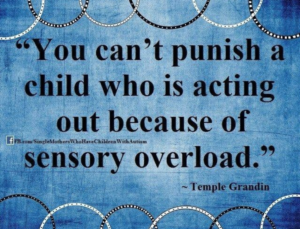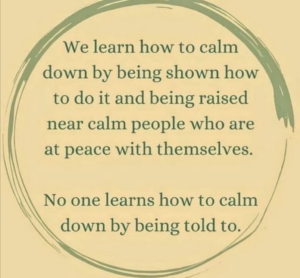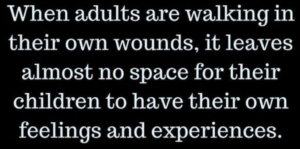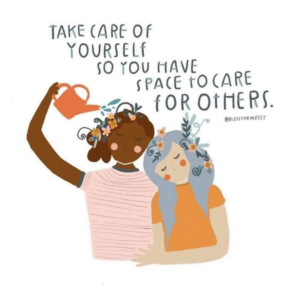Welcome to your new parenting lens: Now you know that your child is not malicious, bad, manipulative, and non-compliant when they show you their worst behaviors. Congratulations on considering this different point of view. The next step is to further dissect what is underneath these behaviors. Read on for more ideas of what may be triggering and contributing to your child exhibiting their worst self. Just understanding the why of behaviors can help you help them to improve. Compassionately appreciating what is behind the behavior can change how you react. And of course, you will need some new parenting strategies to match this new lens. Explore concrete parenting techniques you can use to help your child heal, learn to regulate, and grow! There may even be some advice about caring for your own mental and physical health tucked into then end. Keep reading…
Sensory System

If you read nothing else, absorb this: your child’s unwanted behaviors always come from an upset brain and body. Their nervous system is all jangled. Bad things happened to them when they were little. Their brain is now wired to always be looking for danger or more bad things. Their brains may cause them to get upset quicker than most. Or perhaps they just shut down. The threat of danger has shaped them. These hypervigilant and/or frozen brains and bodies helped them to survive. Now they are with you, this impulse just doesn’t disappear. Their nervous systems are still misfiring to their old environment creating some nasty behaviors. You actually have to help them rewire their brain for safety. It takes time. Try to keep in mind that their undesirable behaviors are just reactions to cues originating in their nervous system. Stress responses. Real rewiring comes from understanding what’s going on in your child and then creating a safe, predictable, consistent, loving and playful environment, where you teach them how to respond to things calmly through co-regulation.
Expectation Mismatch

We all come to the parenting table with expectations. We can’t help but dream about who are children will be, how they will grow, who they will become. Unfortunately life gets in the way and alters things. Maybe you adopted your child from a rough past: now they come with certain wounds that changed them. Or maybe your child had a medical event that also left them with some imperfections. And as parents, we hold onto these unrealistic expectations no matter who our child actually is. Read this article from my previous Newsletter to better understand the mismatch of expectations that almost always occur with parents and children. So what do you do? You gotta honestly examine your expectations of your child. See if these line up with their actual abilities and true developmental age. Then adjust accordingly. Repeat. Hard work! Altering your expectations to the child you actually have, not the one you wish you had, can eliminate those unwanted behaviors.
From Consequences to Co-Regulation

If you’re reading this, you already figured out that traditional parenting techniques do not work for your child. Take time outs, grounding, punishments of almost every kind: these just serve to make your child feel worse then they already do. Remember getting through early trauma left wounds in their self-esteem which are constantly telling them they are not worthy and they stink. Then you put your kid alone in their room to cool off and things worsen because guess what, your child doesn’t know how to do this alone. It doesn’t matter if they are 5 or 15, they need you to help them through the scary stuff happening in their body that is making you want to punish them in the first place. So for a moment, consider using your calming presence instead of a consequence when they are acting badly. This is a hard pill to swallow for most parents. But please acknowledge and believe that your child is wired differently. Their past truly requires more out-of-the box parenting. Give it a try. Next time your child is acting out, stay with them and breathe. Do not use words. Just model the breathe. Or a hug. Or a song. Or a dance. Help them to feel safe, loved, connected and they will show you something wondrous. This takes time and a ton of practice. But it works.
Power of Play
 So, you determined that your child’s nervous system is the culprit of all these bad behaviors? You have bought into the idea that their bodies and brains get overwhelmed and off-kilter due to certain events, sounds, smells, people and situations? Play can be a healing balm. No matter how old your child is. This play must be repetitive to actually do the healing in the brain. If the play is between you and your child, is repetitive, rhythmic and involves the senses, it can actually rewire their brain to learn how to self-regulate. Brain research now suggest that this type of play can be a more powerful intervention that any kind of talk therapy. Check out Robin Gobbel’s piece on exactly how this type of play works. Some quick examples of play include dancing, singing, listening to music, running, jumping, yoga, walking, basketball, nerf guns, bubbles, balloons, swimming, back and forth ball games, and horseback riding. The key is to do these activities repeatedly and with your child. Again, watch the magic that happens if you try this type of play on a regular bases.
So, you determined that your child’s nervous system is the culprit of all these bad behaviors? You have bought into the idea that their bodies and brains get overwhelmed and off-kilter due to certain events, sounds, smells, people and situations? Play can be a healing balm. No matter how old your child is. This play must be repetitive to actually do the healing in the brain. If the play is between you and your child, is repetitive, rhythmic and involves the senses, it can actually rewire their brain to learn how to self-regulate. Brain research now suggest that this type of play can be a more powerful intervention that any kind of talk therapy. Check out Robin Gobbel’s piece on exactly how this type of play works. Some quick examples of play include dancing, singing, listening to music, running, jumping, yoga, walking, basketball, nerf guns, bubbles, balloons, swimming, back and forth ball games, and horseback riding. The key is to do these activities repeatedly and with your child. Again, watch the magic that happens if you try this type of play on a regular bases.
Do Your Grief and Loss Work
 Necessary but painful. If you don’t do it though, you will be repeatedly triggered by your child, not be present in the moment, react inappropriately, the list goes on. You just gotta do the work.What is grief and loss work? Well, if you are a parent of any child, you start with a preconceived notion of who your child is, who they will become, you pin your hopes and dreams upon them: we all do it. Unfortunately no human ends up being what we imagine and ofttimes wish for. Sometimes biological families can hurt our child so bad that they are forever changed. Sometimes, things happen to your child physically that you have no control of which change them inextricably. All parents must do their grief and loss work to be their best selves. It involves lots of letting go and surrendering: tough and painful work. Seeking out a trained professional can be helpful but it is not necessary. Doing this grief and loss work will free you to accept the child you actually have right now. And again with that acceptance, amazing positive change is possible.
Necessary but painful. If you don’t do it though, you will be repeatedly triggered by your child, not be present in the moment, react inappropriately, the list goes on. You just gotta do the work.What is grief and loss work? Well, if you are a parent of any child, you start with a preconceived notion of who your child is, who they will become, you pin your hopes and dreams upon them: we all do it. Unfortunately no human ends up being what we imagine and ofttimes wish for. Sometimes biological families can hurt our child so bad that they are forever changed. Sometimes, things happen to your child physically that you have no control of which change them inextricably. All parents must do their grief and loss work to be their best selves. It involves lots of letting go and surrendering: tough and painful work. Seeking out a trained professional can be helpful but it is not necessary. Doing this grief and loss work will free you to accept the child you actually have right now. And again with that acceptance, amazing positive change is possible.
Self-Care/Respite

What do self-care and respite even mean? That’s just it: it can look different for every single person. The idea is that you cannot raise your child all by yourself. You need support from others who also love and understand your child. You need time away from your child as absence really does make the heart grow fonder. You may need some time to take a nap. Maybe you need someone to care for your other children so you can have some 1-1 time with one of your other kids. Taking care of yourself may mean you actually go to a retreat to recharge and learn something new. Or it may be starting to eat healthier. Perhaps you listen to a podcast to gain a new perspective in your parenting journey. Perhaps you take a hike. The options are endless. But one thing is for certain: parenting is grueling and every single one of us needs a break. This is normal and universal. It really does take a village. So what will you do today?






